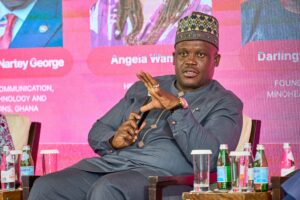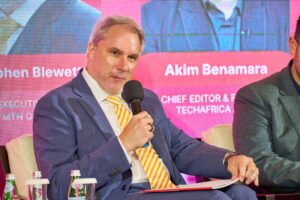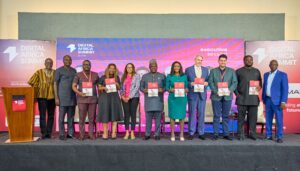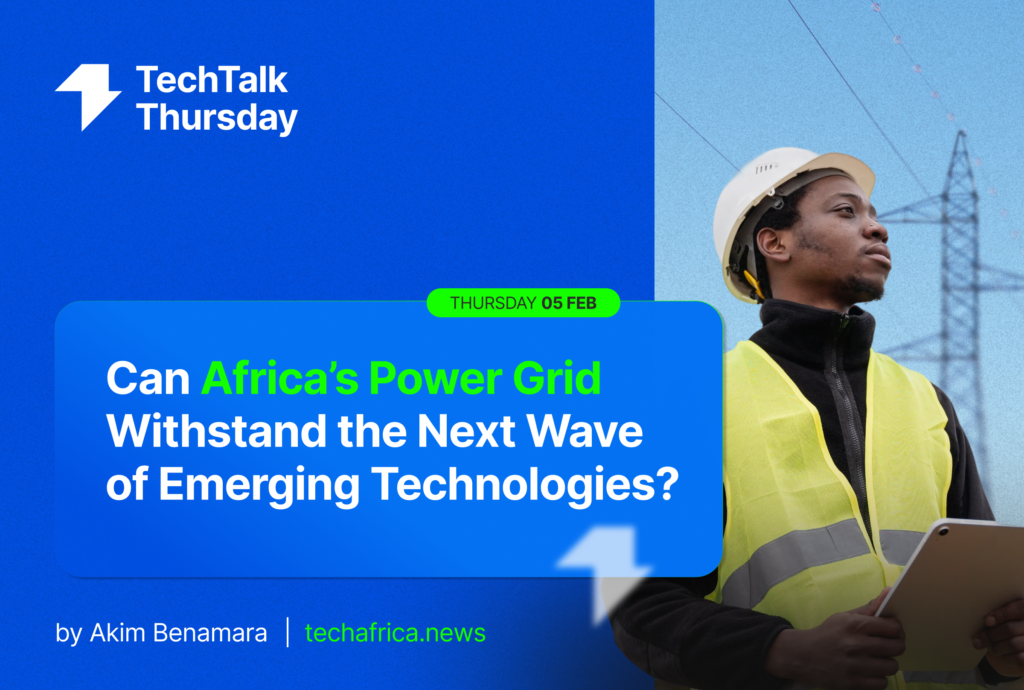Connecting the Dots for Ghana’s Digital Future: Policy, Connectivity, and the AI Leap
Africa stands at a pivotal moment in its history. The continent is home to one of the youngest populations in the world, abundant natural and human resources, and an increasingly connected digital infrastructure. Yet, despite this promise, the gap between potential and reality remains wide. Economic growth, social development, and technological innovation are often constrained by structural challenges — policy misalignment, limited access to capital, and inadequate connectivity. How Africa navigates this era of rapid digital transformation will define its role in the global economy for decades to come.
It was against this backdrop that the Digital Africa Summit, Ghana Edition, convened. Organized by GSMA Africa and Invictus Global Media Group, in partnership with the Digital Chamber of Ghana, and with TechAfrica News as the official media partner, the summit provided a rare opportunity to interrogate both the challenges and the opportunities shaping Africa’s digital future. The event brought together policymakers, regulators, operators, innovators, and investors, creating a forum where bold ideas could be debated, tested, and refined.
At this summit, I had the privilege of moderating the Executive Panel bringing together perspectives from government, industry, and technology: Hon. Samuel Nartey George, Ghana’s Minister for Communications, Digital Technology and Innovation; Angela Wamola, Head of Africa at GSMA; Stephen Blewett, CEO of MTN Ghana; and Darlington Akogo, Founder & CEO of minoHealth AI Labs. The conversation was candid, incisive, and deeply anchored in actionable solutions.
In this #TechTalkThursday edition, we revisit that vital conversation—highlighting key insights, amplifying the voices of leaders on the frontlines, and exploring how Africa can build a connected future that transforms lives and redefines its place in the global digital economy.
Policy as the Foundation of Digital Transformation
When asked to identify the single most transformative action for Ghana’s digital future, Hon. Samuel Nartey George did not hesitate: a strong, forward-looking legislative framework.
“I think that the legislative framework is the foundation. If we’re able to get the right legislative framework for a lot of the things we want to do, put in place by the end of this year, I think that it sets us up, because most of our legislation is looking 10 years ahead, to 2035. It positions Ghana for the work that we want to do in artificial intelligence, cloud computing, and all of those things. So I think legislation is the first thing we need to do.”
–Hon. Samuel Nartey George, Minister for Communications, Digital Technology and Innovation, Ghana
For the Minister, legislation is more than a bureaucratic necessity — it is the scaffold upon which innovation is built. Digital transformation cannot rely solely on market forces. Policies must anticipate technological evolution, projecting beyond the immediate horizon to 2035, ensuring that Africa’s digital economy is not constrained by outdated frameworks.
He also underscored the transformative potential of Ghana’s Universal Access Fund. Traditionally used to extend rural telephony, the fund is being repurposed as a Digital Economy and Innovation Development Fund. The goal is to upgrade rural connectivity infrastructure to 4G-enabled data hubs, turning access into opportunity. Young farmers can access online marketplaces, students can leverage AI learning programs, and communities can participate fully in the digital economy. Connectivity, the Minister reminded us, is not merely a service but it is a catalyst for growth, inclusion, and innovation.
“I think that we have only been able to achieve 50% of the vision of the Universal Access Fund. It is not just about taking connectivity to the people; it is about spurring an economy. Today, we all know that the economy in these areas cannot be driven by voice alone—it can only be done through data. The plan now is for all rural telephony sites to become 4G-enabled, so rural communities can access the internet superhighway. These sites will no longer be just voice-enabled; they will be data-enabled. Once this happens, a young farmer in our hometown, farming yams, can decide to sell his produce on the commodities exchange because he now has a smartphone and internet access. That, in turn, spurs the economy. Network usage will no longer be limited to greetings and small talk; it will become a tool for meaningful economic activity.”
–Hon. Samuel Nartey George, Minister for Communications, Digital Technology and Innovation, Ghana

The Urgency of Inclusive Connectivity
Angela Wamola expanded on this point with striking clarity. Africa’s progress cannot be measured by coverage statistics alone.
“We are leaving more than half of our players behind. With only 37% connected, we are playing a three-and-a-half-man team in a football game. We are never going to win the game,” she said.
Her analogy illustrates a profound truth: meaningful participation in the digital economy is as important as infrastructure itself. With 6G just four years away, failing to address today’s digital divide will only accelerate tomorrow’s inequities. Wamola’s prescription was straightforward: redirect existing resources to ensure universal access to affordable, high-quality digital services. Technology exists; focus and execution are the missing ingredients.
“To be able to play the game, you must understand the rules of the current game, which means we need to figure out how to get everybody on board and empower them. The funds, and the usage of those funds, are essential to providing that connectivity. We are just a few years away from 6G. Africa is struggling to make sure that the digital divide does not materialize. If we do not act, it will only be fast-tracked by AI. We cannot afford to ignore the one thing, the main thing that needs to be done, to ensure that everybody deserves the benefits of a modern, connected life”
-Angela Wamola, Head of Africa, GSMA

The Operator’s Mandate: Spectrum, Investment, and Devices
From the perspective of network operators, clarity and certainty are critical. Stephen Blewett’s message was simple and direct:
“I’m going to give you three things: spectrum, spectrum, and spectrum,” he said.
Operators need clear policies on spectrum allocation, including precise timelines and terms, to make a compelling investment case. Countries like Nigeria and South Africa have extended licensing terms to 20 years, signaling stability and attracting investment in high-performance data centers. Ghana must adopt a similar approach to compete for capital and talent. Stephen also reminded the audience that infrastructure is insufficient without access to devices.
“There is no point in building the best freeway in the world and only giving people bicycles to use it,” he said.
Affordability is a pressing concern. Expanding networks without addressing access risks creating a digital economy that serves only a small, privileged segment of society. True transformation requires a balance of connectivity, infrastructure, and citizen access to devices and digital literacy programs.
“You have to have access to devices and technology to ensure that, as a country, our people have real access to what is available. We all know AI is a big word that everyone talks about—I was thinking we should have a word called GAIL:Gana AI leadership. The point is, I passionately believe that we can lead; we can lead the way in AI leadership, but we must have the right tools. A robust network is essential, of course, but we also need the right equipment. Otherwise, we leave people behind. “
-Stephen Blewett, CEO, MTN Ghana

AI for Healthcare and National Transformation
Generative AI represents one of the most profound opportunities for Africa, and Darlington Akogo illustrated its potential with practical examples. His company, minoHealth AI Labs, has developed Moremi, an AI system trained to process multimodal medical data—from X-rays and mammograms to lab tests, genomics, and ECG readings—to produce medical reports in seconds.
“In Ghana, there are only about 100 radiologists. In countries like Sierra Leone or Liberia, fewer than five. Moremi helps fill that gap, providing early detection for conditions like breast cancer and offering phone-based consultations to guide patients while maintaining healthcare sensitivity,” Mr. Akogo explained.
Moremi is already in use in hospitals in Ghana and over 50 countries globally, demonstrating that AI can address real-world problems efficiently, even in resource-constrained environments.
Beyond healthcare, Akogo outlined an ambitious vision under Ghana’s National AI Strategy: GA-Chat, a generative AI built on Ghanaian public data to assist government service delivery.
“The goal is to make processes faster with the AI system, similar to ChatGPT. It will incorporate Ghanaian data contextually and in its delivery, so that when renewing passports, licenses, or other services, citizens have AI support. This initiative would position Ghana as a leader not only regionally but globally, as no other government has implemented such a system.”
-Darlington Akogo, Founder & CEO, minoHealth AI Labs

This exemplifies digital sovereignty, where African data powers African AI to serve African citizens. It is a model for how technology can accelerate public service, economic growth, and global competitiveness while ensuring local leadership in the digital age.
The Interplay of Policy, Investment, and Technology
The panel highlighted a simple yet powerful principle: Ghana’s digital future, as well as Africa’s, is shaped by the interplay of policy, investment, and technology. Legislation creates certainty for investors, spectrum allocation enables operators to expand infrastructure, and AI ensures that technology delivers tangible benefits to citizens. Missing any of these components jeopardizes the continent’s ability to compete globally.
This framework is not theoretical; it is urgent and actionable. From the young farmer accessing an online commodities exchange to a rural hospital using AI to detect disease, the choices made today about policy, investment, and technology will determine the opportunities available to future generations.
The Digital Africa Summit Ghana Edition reminded all participants that Africa has the talent, resources, and technology to lead in the global digital economy. The challenge is to convert potential into tangible outcomes. Bold policy, inclusive connectivity, and innovative AI solutions are essential levers.
Ghana is taking meaningful steps—reimagining the Universal Access Fund, strengthening legislative frameworks, providing clarity on spectrum, and pursuing national AI strategies. These measures are not just interventions; they are signals that Africa can and must take ownership of its digital future.
The summit left a clear message: the continent’s digital destiny will not be written for it—it must be written by it. Africa’s moment is now, and the time to act is immediate. Connectivity, innovation, and digital inclusion are not optional—they are imperatives.







